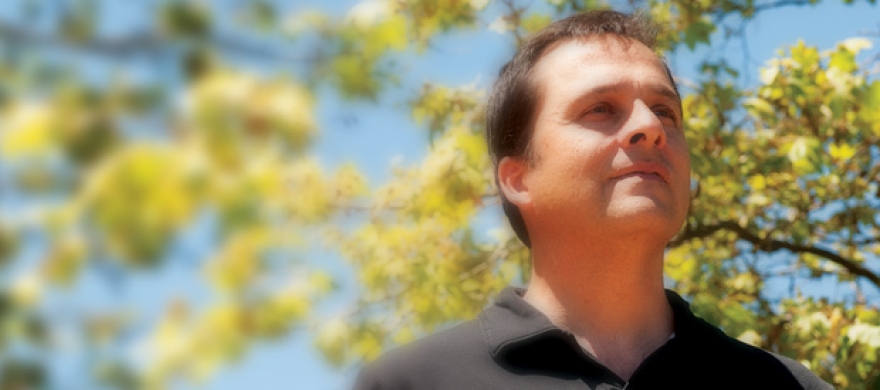In His Eyes
Psychology professor Steven Rouse proposes that to believe in a loving God is to believe in a loved self.
Those of us exposed to the popular thinking of Dr. Phil know that “self-esteem” is a sticky issue in modern psychology. The trending theory goes that people need just the right level of self-esteem; if yours is too low, you risk unhealthy relationships, addictive behavior, and depression. If it’s too high, you’re probably the school or office bully.
Now Steven Rouse, professor of psychology at Seaver College and chair of the Social Sciences Division, adds a spiritual element to the body of research on self-esteem with a theory about God-given value he calls “Universal Worth.”
“Universal Worth is a reason for positive self-esteem—a person can value their self because they have value to a deity and not because they’re any better than anyone or because they’ve experienced success or failure,” he explains.
The proposition, Rouse continues, is that people have a high level of Universal Worth if they exhibit three belief patterns: they value themselves because they believe they are valued by God; they believe that God values all people, universally; and they believe that their value, in the eyes of God, is not contingent upon good or bad behavior.
He developed the theory in part as a response to what he calls a “simplistic” shift in psychology: from considering high self-esteem to be the golden ticket to life success, to viewing it as dangerous and aggressive. “A 2004 study showed that, just as chronic bullies in a school setting often have higher than average self-esteem, so do the kids who stand up against bullies to protect victims,” he says by way of example. “It’s inaccurate to say that high self-esteem is negative, just as it’s inaccurate to say that it’s the cure for society’s problems.”
Rouse hopes to show in his study—which, though still in its early stages, he summarized in an article titled “Universal Worth” to be published in the Journal of Personality Assessment (Fall 2011)—that it’s not just the level of self-esteem that determines psychological and behavioral health but also the root of that self-esteem. As a long-time Christian and psychologist, he had been engaging in clinical personality research and substance abuse research for many years, but was itching to study something more applicable to his own life. He thought about his own faith journey and the people in his life he considered to be mature, “heroes of faith,” and the characteristics in them he would personally want to emulate: positive high self-esteem coupled with high levels of faith in a loving God.
Among his first test subjects have been volunteer Pepperdine students, who completed a number of questionnaires formulated by Rouse to collect the first batch of data. So far the results appear to back up his theory of Universal Worth, and anecdotal evidence from his Introduction to Psychology freshman class supports his idea that belief in God-given value is psychologically enriching.
Rouse was encouraged by the example of a student who shared with him her experience of overcoming an eating disorder. “She spoke about how her unhealthy relationship with food really tied back to a lack of belief in her own worth as a person, until some people in her church helped her see that God does value all people. And if he values all people, then he values her.”
Rouse’s research reflects changing values in the field of psychology, which had long ranked religion and spirituality as fringe, almost-taboo topics but is now catching up to the idea that they could be worthwhile assets to the human experience. Recent studies point to the value of religion as a unifying experience with health benefits, including a 2006 study from the University of Pittsburgh, which found that churchgoers seem to live up to three years longer than non-churchgoing people.
Still, Rouse encountered a more rigorous vetting process when he submitted “Universal Worth” for publication than he experienced with his mainstream research—a process he relished for its added opportunity to prove his study as a legitimate topic of research. He also contends that equal value in the eyes of God does not lessen any individual’s value. “I think from our limited human ability, it’s hard not to rank people in the order of value we see in them. That’s one profound difference between our ability to value people and God’s ability to value people.”
“One challenge I have is making clear that I’m not proselytizing within my research, since it’s not my job to convert people to a specific religious worldview,” he asserts. “And I don’t believe that this is the only desirable form of self-worth.”
As he moves forward with the study, Rouse is curious to discover if the evidence supports his prediction that people with high levels of Universal Worth are more likely to behave altruistically, if they believe other people are valued as highly by God as they are. It’s the one area of his research that he hopes to share with two people in his life that he values very highly indeed: his two sons, aged 12 and 9.
“If I want my own kids to see value in themselves, what kind of value is it that I want them to learn?” he asks. “Ultimately, I realized that it’s not that I want them to see just see value in themselves—I want them to see value in all people, including themselves.”
